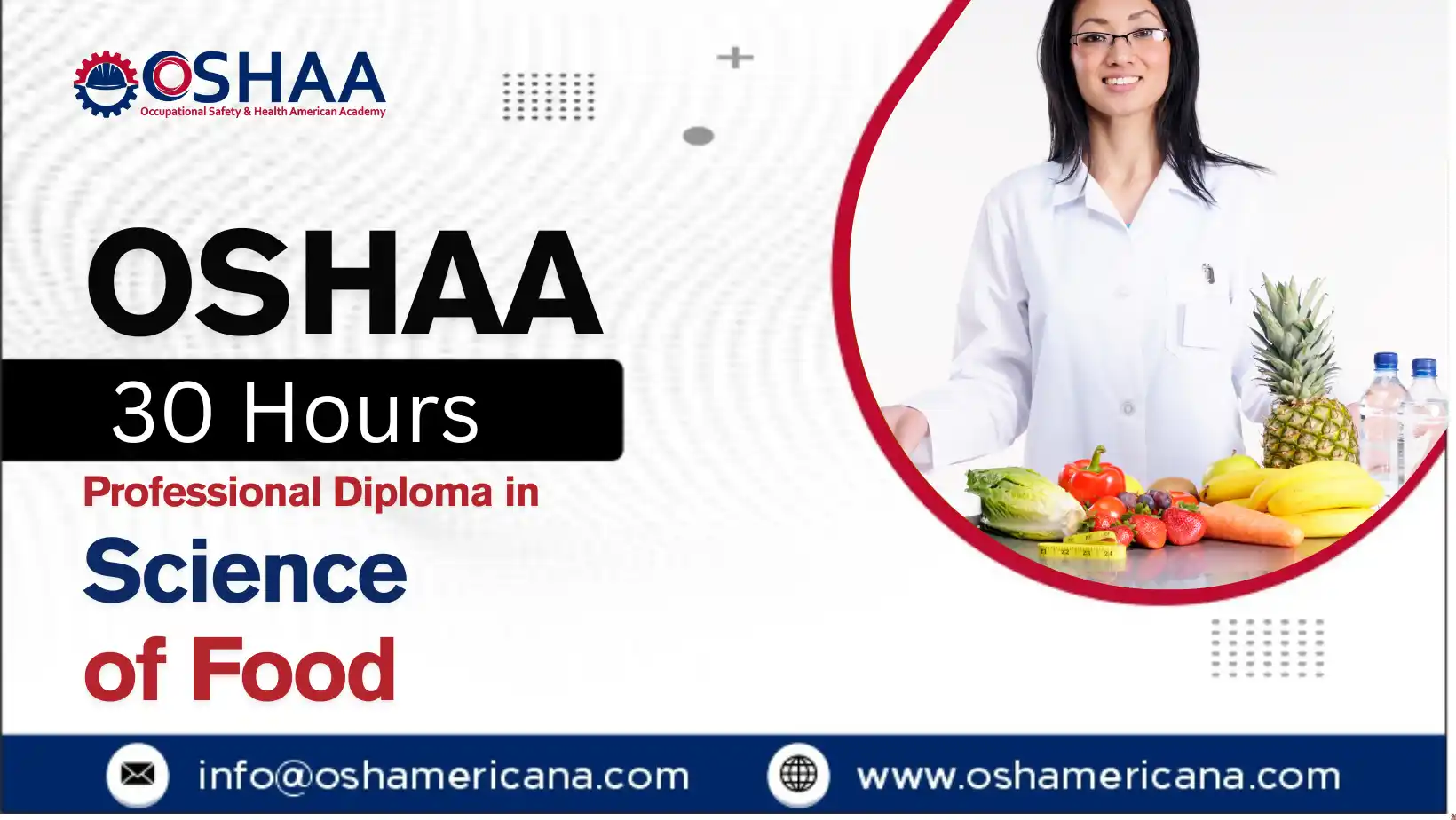Master the Science of Food with Professional Diploma
The science of food is an essential and ever-evolving field that combines biology, chemistry, and nutrition to understand how food supports health, sustains life, and affects wellbeing. The OSHAA 30-Hours Professional Diploma in Science of Food provides participants with a comprehensive and practical foundation in food science, enabling them to explore the intricate relationships between food components, processing techniques, safety standards, and nutritional impact.
Food is far more than sustenance; it is a complex subject involving scientific analysis, technological innovation, and cultural relevance. With growing global interest in food safety, health, sustainability, and nutrition, understanding the science behind what we eat has never been more important. This diploma is designed for those who wish to explore the key scientific principles that influence food quality, composition, and function.
The OSHAA 30-Hours Professional Diploma in Science of Food covers a wide range of essential topics, including the chemical and physical properties of food, human digestion and metabolism, food preservation techniques, and the role of food processing. Participants will also explore food microbiology, labelling regulations, functional foods, and the impact of dietary choices on public health.
The OSHAA 30-Hours Professional Diploma in Science of Food is designed to meet modern needs in food education, safety, and health promotion. With a curriculum grounded in current science and policy, the course equips participants to make informed decisions, support others, and contribute meaningfully in health, wellness, or industry settings.
After completing the diploma, participants may progress to further study in human nutrition, dietetics, food technology, or health sciences. It also complements professional roles in fitness, education, hospitality, and public health initiatives.
OSHAA 30-Hours Professional Diploma in Science of Food
Study Units
Learning Outcomes
This course is designed for individuals passionate about food science, nutrition, and health, as well as professionals aiming to advance their expertise in the food industry. It caters to a diverse audience seeking practical knowledge, career growth, and a strong foundation in the science of food.
Introduction to Food Science and Nutritional Biochemistry
- Gain a clear understanding of the interdisciplinary nature of food science
- Learn the biochemical components of food and their nutritional significance
- Explore how food composition impacts human health
- Develop foundational knowledge in nutritional biochemistry
- Ideal for beginners or professionals seeking to strengthen core concepts
Macronutrients and Micronutrients: Roles in Human Health
- Understand the structure and function of carbohydrates, proteins, and fats
- Learn the physiological roles of vitamins and minerals
- Evaluate dietary sources and recommended intakes for optimal health
- Recognize nutrient interactions and their impact on wellness
- Enhance knowledge for nutritional planning and health promotion
Digestion, Absorption, and Metabolism of Nutrients
- Explore the processes of digestion and nutrient absorption
- Understand how macronutrients are metabolized for energy
- Identify factors affecting nutrient bioavailability
- Learn to link diet with metabolic health outcomes
- Gain insights relevant to clinical nutrition and dietetics
Food Composition and Chemical Properties
- Analyse major food components: water, proteins, lipids, and carbohydrates
- Understand how chemical properties affect taste, texture, and nutrition
- Evaluate the impact of cooking and processing on nutrient retention
- Develop skills to assess food quality and functionality
- Strengthen practical knowledge for food product development
Food Microbiology and Safety Standards
- Identify common foodborne pathogens and microbial risks
- Understand principles of hygiene and contamination prevention
- Explore legislation and safety standards in food protection
- Learn to implement best practices in food handling
- Enhance skills for ensuring consumer safety and regulatory compliance
Food Processing and Preservation Techniques
- Understand traditional and modern food preservation methods
- Evaluate the impact of processing on nutrient retention and shelf life
- Assess the benefits and drawbacks of various preservation techniques
- Learn practical approaches to maintain food quality
- Develop knowledge applicable to the food manufacturing industry
Functional Foods, Additives, and Nutritional Fortification
- Define functional foods and their role in promoting health
- Identify common food additives and regulatory approvals
- Understand principles of food fortification for nutrient enrichment
- Explore innovative approaches to functional product development
- Enhance ability to evaluate health claims and food innovations
Food Labelling, Packaging, and Consumer Regulations
- Interpret nutrition labels and ingredient lists accurately
- Understand food labelling laws and consumer rights
- Recognize how packaging influences purchasing decisions and safety
- Gain knowledge to ensure regulatory compliance
- Learn practical applications for product marketing and consumer education
This course equips learners with comprehensive knowledge in food science, nutrition, and safety, enabling them to make informed decisions, improve food quality, and enhance public health outcomes. It is ideal for aspiring nutritionists, food technologists, and professionals seeking to excel in the dynamic food industry.
- Develop a strong foundational understanding of food composition, nutrient function, and human metabolism
- Gain practical insights into the scientific principles behind food preparation, preservation, and processing
- Learn how to evaluate the nutritional quality and safety of various food products
- Understand the impact of diet and nutrition on health, disease prevention, and wellbeing
- Explore the role of functional foods, additives, and fortification in modern diets
- Improve knowledge of food microbiology and safety regulations for quality assurance
- Acquire skills to interpret food labels, assess consumer information, and apply legal standards
- Build confidence in applying food science in nutrition, health promotion, food production, or education
- Strengthen professional credentials in fields such as public health, hospitality, fitness, or wellness coaching
- Achieve a recognised diploma that supports continuous learning and enhances career progression in the food and health sectors
This course is designed for individuals who seek to deepen their knowledge of food science and its application to health, safety, and nutrition. It is especially suitable for:
- Nutrition and wellness professionals aiming to expand their scientific understanding of food and its impact on health
- Food industry workers involved in quality control, product development, or labelling compliance
- Health educators and communicators who deliver information on diet, food choices, and public health
- Fitness professionals and wellness coaches supporting clients with evidence-based dietary guidance
- Culinary professionals and caterers interested in the nutritional and functional aspects of food
- Individuals preparing for further study or careers in nutrition, dietetics, public health, or food technology
This diploma is accessible to participants from both scientific and non-scientific backgrounds and does not require prior academic training in food science.







